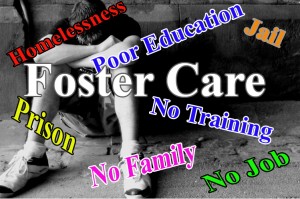 Anchorage – Wednesday, two former foster youth, Representative Les Gara (D-Anchorage) and foster care advocate Amanda Metivier, released sobering numbers for the growing number of Alaska youth in foster care. They are also calling for attention to the over 2,400 foster youth for which the state is the legal guardian.
Anchorage – Wednesday, two former foster youth, Representative Les Gara (D-Anchorage) and foster care advocate Amanda Metivier, released sobering numbers for the growing number of Alaska youth in foster care. They are also calling for attention to the over 2,400 foster youth for which the state is the legal guardian.
“No parent or guardian would accept it if their children faced staggering levels of homelessness, incarceration, and poor high school graduation numbers,” said Rep. Gara citing UAA Institute of Social and Economic Research and Federal “National Youth in Transition” studies.
Gara and Metivier stress that they do not blame an understaffed and underfunded Office of Children’s Services or social workers in that office who often work long hours to make up for the shortage of staff.
Gara and Metivier have teamed up on numerous foster care reforms over the past 6 years and they have worked with the Legislature to pass them. These reforms have increased the availability of job training, college scholarships, and bolstered homelessness prevention efforts. The reforms have also kept siblings from being separated while in foster care, extended foster care to age 21 for youth who need stability after an unstable childhood, enhanced the ability of youth to stay in their home communities, and kept youth from bouncing between schools.
The most recent studies show:
Excessive Homelessness: Roughly 20% of Alaska foster youth ended up homeless in 2013. When the definition of homelessness was broader until 2011, and included youth who stayed at friends homes, or couch surfed, that number was 40%. National Youth in Transition 2011, 2013 Youth Outcome Reports.
Failing High School Graduation Rates: The Office of Children’s Services is understaffed and cannot divert front line social workers to data collection. While OCS does not keep comprehensive high school graduation numbers, in Anchorage, where they are kept, only 45% of foster youth graduated in the most recent year for which data is available, 2010. Barb Dexter, ASD Child in Transition Program.
Alarming Jail Rates: 24% of Alaska foster youth report being incarcerated at some point in their lives. National Youth in Transition Database, 2013 Baseline Data. That far exceeds the jail rate for youth who do not go through foster care. Statewide less than 1% of the general population is incarcerated.
Waiting For A Family: “The goal in foster care is a permanent home, either through reunification with a natural parent, or an adoptive permanent family placement,” notes Metivier. As of 2013 almost 1,000 foster youth were waiting for adoption.
Up To 40% of Foster youth End Up At Covenant House: Though not comprehensive, a study by UAA’s Institute of Social and Economic Research indicates up to 40% of foster youth end up at Covenant House at some point in their lives. “That’s not a call to accept the status quo,” said Rep. Gara.
Alaska Native Youth are Overrepresented in the Foster Care System by 300%: Alaska Native youth make up 20% of Alaska’s population. They make up 60% of Alaska’s growing population of over 2,400 foster youth. ISER 2014 Ethnicity Trends in Foster Care Study
“The state’s own commissioned 2011 study shows the foster care system is understaffed to adequately offer needed help for foster youth and foster parents,” said Metiver. “Foster parents are in shortage and often quit because of a lack of staffing that creates delays in needed responses to their requests for help. And the lack of staffing has left a line of youth in foster care waiting for an adoptive home.”
“We are working on legislation and hope to find bi-partisan support to fix a system for youth the state has a legal obligation to protect,” said Rep. Gara. “Fixing foster care and keeping youth out of jail, in school, off the streets and off expensive public assistance will save, not cost Alaska money.”
The legislation being drafted includes provisions to reduce the number of youth sent out on their own before age 21, increase efforts to find adoptive homes, increase success in education and work after foster care, increase the number of youth who find a permanent home, and decrease homelessness among foster youth.
For more information contact Rep. Les Gara at 250-0106 or Amanda Metivier at 230-8237.







